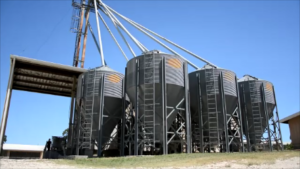Pilgrim’s Pride $1 million gift to modernize Texas A&M’s poultry feed mill
- Writer: Adam Russell, 903-834-6191, [email protected]
- Contact: Dr. David Caldwell, 979-845-4747, [email protected]
COLLEGE STATION- Texas A&M University’s department of animal science poultry feed mill in College Station provides tens of thousands of chickens with nourishment each day, but is more than half a century old and showing its age.

Amid a layer of cobwebs, corn dust, soybean flakes and other ingredients that make up tons of feed produced for dozens of the university’s poultry science research projects each week lies archaic machinery that is holding back scientific progress and giving the staff headaches and daily worries.
However, a $1 million gift from Pilgrim’s Pride is expected to improve capacity and reliability by replacing the 54-year-old system.
Dr. Jason Lee, assistant professor for poultry nutrition, College Station, said the goal of the department and studies conducted through Texas A&M AgriLife Research is to grow better chickens while being more efficient, and the new feed mill will help scientists in that endeavor.
“Our research focuses on nutrient densities,” said Lee. “So how much energy, protein and minerals are in the feed, and we observe how that affects growth performance.”
The current feed mill is a 1963 California Pellet Mill system refurbished and installed for the poultry department in 1986, said Russell Rhoden, assistant facility manager. When it was put in, it could churn out 2 tons of feed per hour, but now it can only operate at half-speed, producing a ton per hour for the department’s 20,000 to 25,000 laying and broiler chickens.
The feed mill is the epitome of inefficiency.
According to Rhoden, unloading 53,000 pounds of corn takes an hour and a half, when it could take minutes with the new system. Corn is dumped into a small unloading auger that is swung under the grand trailer manually by staff. Micro-ingredients, such as phosphorous, vitamins and minerals for specific research experiments are added into the mixer manually.
Steam, which binds the ingredients, is adjusted by hand based on “sights and sounds” of the machine. The levels of steam must be precise to avoid clogs or poor pellet binding.
“You know when it’s happy, and you know when you might have a long day ahead of you,” Rhoden said.
Researchers are forced to order 100 more pounds of feed than necessary for each treatment to account for spillage from rusted–out holes in the system that are often covered by foil and duct tape.
Rhoden and other mill operators stay until feed is produced on schedule for projects. Researchers are cognizant of their time because some staff are full-time students, but the feed mill staff are also aware of their responsibility to the department and the animals. As a result, they often work 50- to 60-hour weeks and sometimes around the clock to meet schedules.
“Not having enough feed is not an option,” Rhoden said. “We’ve never lost a bird because of a breakdown, but you never know how long you might be from one day to the next to keep the mill going.”
Because the machine is so old, parts must be fabricated by CPM, the original feed mill system company, so breakdowns of the machine can mean several days before feed turnout begins again, according to Micah Osburn, associate facility manager. Monthly maintenance and cleaning schedules sometimes need to be pushed due to feeding schedules.
“We’d love to be able to do proactive maintenance on the equipment, but that is rarely an option because we can’t afford the down time,” Osburn said.
The new system will increase the mill’s capacity to 4-5 tons per hour. Osburn said the increased capacity means the system won’t have to run every day and new machinery means the staff won’t be crossing their fingers and hoping for the best when they arrive each day.
Dr. David Caldwell, department head, said he was grateful to Pilgrim’s Pride for its generous support and establishment of the Department of Poultry Science Feed Mill, Industry Education and Outreach Support fund.
Caldwell said he believes the expansion of the faculty-led research programs, student education opportunities and outreach programs with the commercial poultry industry have been suppressed by the current feed manufacturing capacity.
“This gift comes at an exciting and critical time in our department’s growth,” Caldwell said. “This timely gift from Pilgrim’s Pride will allow us to modernize our feed mill with commercial industry-relevant equipment and boost our feed manufacturing capacity. That added capacity will also feed expanded research in poultry sciences over the next several decades.”


